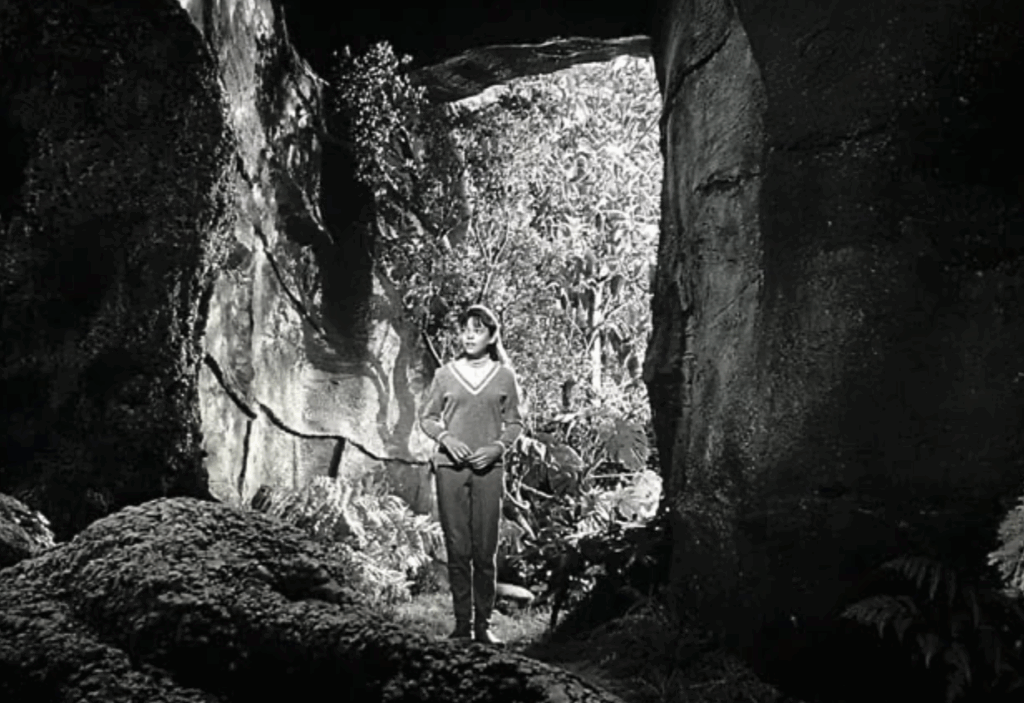
Lost in Space: Season 1, Episode 7
Directed by: Paul Stanley
Starring: Guy Williams, June Lockhart, Mark Goddard, Angela Cartwright, Bill Mumy
Rating: FIVE out of FIVE disembodied voices
I’m just an echo, that’s all.
They left Earth, but the gender roles stayed written. John Robinson and Don West are off doing manly survival things. They blow up boulders, dig for minerals, and try to science their way out of exile. Meanwhile, young Will lingers around the tech. He’s the golden boy, naturally, and is allowed a seat at the grown-up table.
Maureen and Judy Robinson take on feminine roles, nurturing and homemaking. Maureen, ever the portrait of the 1960s housewife is coiffed, composed, and quietly sidelined. She spends her days doing space laundry and preparing interstellar casseroles. Stranded lightyears from Earth, she clings to the domestic role. She doesn’t rage against their cosmic misfortune. She doesn’t question why she’s still ironing blouses while her husband explores. She simply adapts, folding towels while the universe laughs at their misfortune of being stranded on a desolate planet. Her calm isn’t resilience, it’s resignation. A kind of graceful surrender to the roles that followed them into the void. Even in deep space, the apron strings hold tight.
Judy, the eldest sister, spends her time fussing with her hair. She’s teasing, smoothing, and pinning. Perfecting a look no one’s around to admire. She’s a beauty queen adrift in a vacuum, holding on to a ritual as if her updo might hold the universe together. It won’t, but no one’s had the heart to tell her.
And Penny? Penny’s the ghost in the corner. Caught in the in-between. Too old for dolls, too young for duty. She craves purpose the way other kids crave candy. She offers to help but gets the same soft dismissal every time. A smile. A nod. A “why don’t you run along now and play, dear,” as if her need to contribute is a phase to be grown out of.
They don’t mean harm. That’s the worst part. Their condescension is wrapped in warmth. It’s the type of kindness that erases you while pretending to see you. Penny’s not invisible. She’s politely ignored. Which, in some ways, is lonelier.
Penny wasn’t sent on a mission. She wasn’t even exploring. She’s escaping. From dismissal, from irrelevance, from a family structure where even the Robot gets more agency than she does. She wanders because there’s nowhere else for her to be. She drifts into plot. Not out of rebellion, but because she has no tether.
And that isolation catalyzes everything. Penny drifts away from the family camp, not in defiance, but out of quiet neglect. No one’s watching. No one’s asking. So she slips into a cave and finds something waiting. A voice, disembodied and uncertain, speaks to her gently. It doesn’t know where it came from, what it is, or why it exists. She names it Mr. Nobody, because that’s what it feels like to her. A ghost of a presence, just like her place in this mission.
When she tries to explain it to the others, they write it off as imagination. A phase. Maureen even smiles and admits she once had an imaginary friend too, some whisper tucked inside her childhood teddy bear. But it’s not the same. This isn’t pretend. This is connection. This is Penny finding something that listens to her, that values her voice, that doesn’t pat her on the head and sends her off to play.
Her journey isn’t heroic. It’s quiet, interior. But it’s also devastating. Her loneliness births the story’s heart, and when that fragile thread is cut, the audience feels it. That’s the power of isolation. It doesn’t just shape the plot. It is the plot. Wrapped in cave walls and whispered voices, disguised as science fiction. But really, it’s just a girl talking to the one thing that finally talked back.